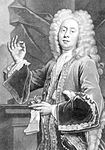|
Thomas Shadwell
Thomas Shadwell (c. 1642 – 19 November 1692) was an English poet and playwright who was appointed Poet Laureate in 1689.[1] LifeShadwell was born at either Bromehill Farm, Weeting-with-Broomhill or Santon House, Lynford, Norfolk,[2] and educated at Bury St Edmunds School, and at Gonville and Caius College, Cambridge, which he entered in 1656.[3] He left the university without a degree and joined the Middle Temple. At the Whig triumph in 1688, he superseded John Dryden as poet laureate and historiographer royal. He died at Chelsea on 19 November 1692.[4] He was buried in Chelsea Old Church, but his tomb was destroyed by wartime bombing. A memorial to him with a bust by Francis Bird survives in Poets' Corner in Westminster Abbey.[5] He was married to the actress Anne Shadwell, who appeared in several of his plays. They had four children including the playwright Charles Shadwell and John Shadwell, a physician who attended to both Queen Anne and George I.[6] WorksIn 1668 he produced a prose comedy, The Sullen Lovers, or the Impertinents, based on Les Fâcheux by Molière, and written in open imitation of Ben Jonson's comedy of humours. His best plays are Epsom Wells (1672), for which Sir Charles Sedley wrote a prologue, and The Squire of Alsatia (1688). Alsatia was the cant name for the Whitefriars area of London, then a kind of sanctuary for persons liable to arrest, and the play represents, in dialogue full of the local argot, the adventures of a young heir who falls into the hands of the sharpers there.[7][8] For fourteen years from the production of his first comedy to his memorable encounter with John Dryden, Shadwell produced a play nearly every year. These productions display a hatred of sham, and a rough but honest moral purpose. Although bawdy, they present a vivid picture of contemporary manners.[9] Shadwell is chiefly remembered as the unfortunate Mac Flecknoe of Dryden's satire, the "last great prophet of tautology", and the literary son and heir of Richard Flecknoe:
Dryden had furnished Shadwell with a prologue to his True Widow (1679) and, in spite of momentary differences, the two had been on friendly terms. But when Dryden converted to Catholicism, joined the court party and produced Absalom and Achitophel and The Medal, Shadwell became the champion of the Protestants and made a scurrilous attack on Dryden in The Medal of John Bayes: a Satire against Folly and Knavery (1682). Dryden immediately retorted in Mac Flecknoe, or a Satire on the True Blue Protestant Poet, T.S. (1682), in which Shadwell's personal attacks were returned with interest. In 1687, Shadwell attempted to answer these attacks in a version of Juvenal's 10th Satire.[9] However, Dryden's portrait of Shadwell as Og in the second part of Absalom and Achitophel cut far deeper and has withstood the test of time:
Nonetheless, due to the political triumph of the Whig party in 1688, Shadwell superseded his enemy as Poet Laureate and historiographer royal.[9] His son, Charles Shadwell was also a playwright. A scene from his play The Stockjobbers was included as an introduction in Caryl Churchill's Serious Money (1987).[4] PoemsDear Pretty Youth
Love in their little veins inspires
Nymphs and Shepherds
BibliographyA complete edition of Shadwell's works was published by another son, Sir John Shadwell, in 1720. Thomas Shadwell's other dramatic works are:
See alsoNotes
References
External linksWikiquote has quotations related to Thomas Shadwell.
|
||||||||||||||||||||||||||||||||||||||||||||||

